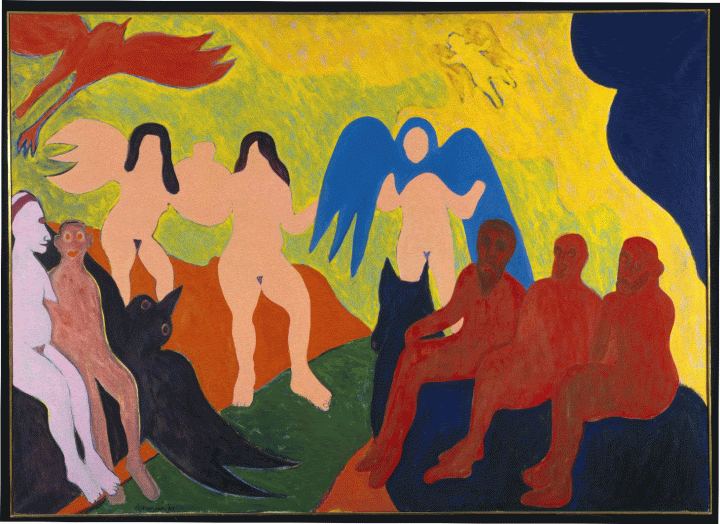The new program allows people arrested for minor offenses, like shoplifting or painting graffiti, to avoid jail time and a court appearance by taking a two-hour course.
Titus Kaphar, “Shifting the Gaze” (2017), Oil on canvas, 83 × 103 1/4 (courtesy of Jack Shainman Gallery and the Brooklyn Museum)
A new program in New York City allows people arrested for minor offenses to avoid jail or court appearance by enrolling in an art course. A pilot run of the program has shown a reduction in recidivism and an improved view of criminal justice agencies among participants, a study by the Court Center for Innovation says.
The city’s Project Reset allows people who are arrested for low-level offenses — fare beating, painting graffiti, shoplifting, and trespassing, among others — to avoid prosecution and incarceration by taking a two-hour course at the Brooklyn Museum. After finishing the course, cases are dismissed, arrest records are sealed, and no criminal court record is registered. Drug offenses are not included in the program. They are treated in another city program called Brooklyn Clear.
“It’s about holding people accountable, but doing it in ways that promote human dignity,” said Brooklyn District Attorney Eric Gonzalez at a press conference at the Brooklyn Museum on October 21. “It requires individuals to view and discuss a piece of art with people they don’t know,” he added. “They’re asked to create their own art, to think and find meaning in that art.”
The art course at the Brooklyn Museum, sponsored by the Manhattan District Attorney’s Office and supported by the New York Police Department (NYPD), was launched in the spring of this year as a pilot program. So far, 200 people have participated in the programs and had their cases dismissed, according to Gonzalez. An earlier version of the project that involved art courses in community centers was launched in Brownsville, Brooklyn in 2015, and it was available only for 16 and 17-year-olds (it was later expanded to all ages in Brooklyn, Manhattan, and the Bronx). Another section of the program offers discussion groups that allow participants to reflect on the conditions that had led to their arrest.
A study conducted by the Center for Court Innovation, a partner in the project, shows that participants had fewer re-arrests and new convictions, and longer times to re-arrest and conviction, compared to individuals who have not taken part in the program.

Bob Thompson, “Judgement” (1963), Oil on canvas, 60 x 84in (© Michael Rosenfeld Gallery LLC, New York, NY; Courtesy of Michael Rosenfeld Gallery LLC, New York, NY)
Participants at the Brooklyn Museum program are divided into two age groups (one for ages 18 to 25 and another for age 26 and older). Sessions are held by teaching artists Sophia Dawson and Kraig Blue. The younger group’s class focuses on Titus Kaphar’s “Shifting the Gaze” (2017) while the older group discusses “Judgement” (1963) by Bob Thompson. According to Adjoa Jones de Almeida, director of education at Brooklyn Museum who spoke at the press conference, the artworks were chosen for their “potential to spark dialogue around themes of agency, defining our own narrative versus being defined by others.”
Kaphar’s “Shifting the Gaze” is based on a 17th-century Dutch portrait of a wealthy white European family, which he strategically painted over with white paint during a 2017 TED Talk, leaving visible a Black boy believed to be the family’s servant.
The classes include a group discussion of the artworks and an art-making workshop. “After we take a look at Titus Kaphar, ‘Shifting the Gaze’ we go back and kind of recreate some of his process in this painting,” said Dawson at the press conference. The artist said she provides the participants with news articles and images from the museum’s collection to create collages that can “shift the gaze on how someone looks at you personally […] on how people see your community, your neighborhood.”
“It definitely helped me avoid the anxiety of having to attend an actual court date for a mistake I made,” Jessy Singh, a program participant who was initially arrested for shoplifting, said at the press conference. “It helped to make me feel human in a system that often criminalizes people for like the smallest of things, bad choices, wrong place wrong time.”

